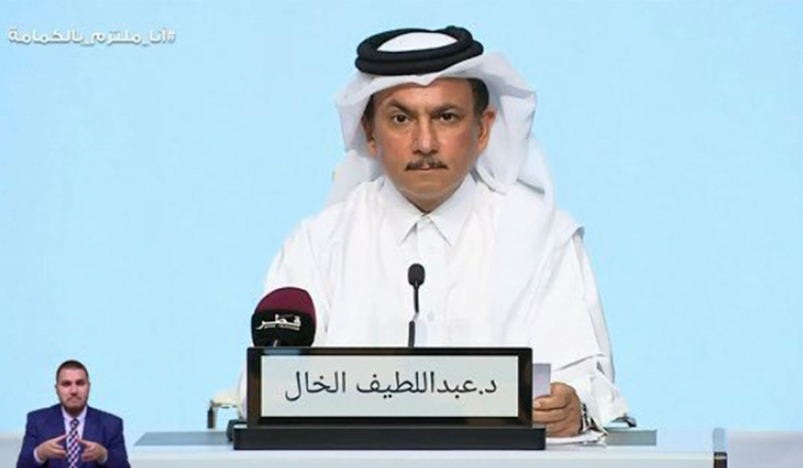
We are still in the mid of the 2nd COVID-19 wave, have not reached the peak yet: Dr. Abdullatif Al-Khal
We are still in the middle of the second wave of the Coronavirus pandemic and we have not yet reached the peak, Dr Abdullatif Al Khal, Chairman of the National Pandemic Preparedness Committee, said at a press conference held to explain the current Covid-19 situation in Qatar.
He said that most of the recent cases of Covid-19 are due to social visits and there is a significant increase in the number of patients in intensive care due to the high number of infections and emergence of new strains.
He added that the increase in the number of deaths recently is also due to the new Covid-19 strains.
During the past week, 1,468 new Covid-19 cases were admitted to the hospital due to severe inflammation in the lungs and 266 cases were admitted to intensive care, stated Dr. Al Khal, adding that the South African stain has had a significant impact on the rise in coronavirus infections in the country during the past 10 days.
More restrictions required to deal with rapidly-spreading of South African variant, says Dr Khal
The chair of Qatar’s National Health Strategic Group on COVID-19 said more restrictions are required to stem the spread a South African strain of the coronavirus, which is being blamed for the surge in infections in the past 10 days.
Dr Abdullatif Al Khal, who is also the head of Infectious Diseases at Hamad Medical Corporation (HMC), said the restrictions imposed since February have played a key role in preventing the situation from escalating.
“We have quickly imposed many restrictions since February, with the increase in cases. The restrictions have contributed to limiting the spread of infections,” Dr Khal said, while reminding that Qatar was still going through a second wave of the virus transmissions.
“We have not reached the peak yet, and it is worth noting that most of the infections in this wave are among citizens and residents with white collar jobs and among their families.”
Dr Khal singled out family visits as the biggest causes of infections as he drew a grave picture of the current situation.
“We are witnessing a remarkable increase in the number of cases requiring admission to intensive care. As many as 266 people were admitted to ICUs in the past week,” he said.
The percentage of positive tests for those with symptoms is 30%, and the percentage of positivity among contacts reaches 11%, Dr Khal added.
Several strict policies aimed delaying the second wave has proven effective preventing the entry of new strains into the country, he noted, adding that the country had one of the strictest quarantine and exit and entry policies in the world.
According to Dr Khal, The vaccines from Pfizer-BioNtech and Moderna have proven effective against the South African and British strains of the coronavirus, Dr Khal said.
“Having given one million doses of the vaccine is a great achievement that saw 26 percent of the adult populating getting at least one dose,” he said.
“We ask everyone, including those who have taken the vaccine, to make sure to apply the new preventive measures and restrictions more than ever, because this is the fastest way now to reduce infections and deaths.
“I know for sure that implementing these measures before Ramadan will be difficult for the society, but we have to have the strength and will to curb the spread of the virus as we did before. However, in the event of laxity and if the number of cases keep rising, we may resort to escalating restrictions further.”
Maintaining or easing the restrictions of Corona requires two or 3 weeks in order to assess their effects, he said.
"If all of us assume their responsibilities and act appropriately during the period between the next two to four weeks, we will be able to reduce the number of cases and then roll back the restrictions."
We have both UK and South Africa Covid-19 variants circulating in Qatar: Official
Dr. Abdullatif Al Khal, Chair of the National Health Strategic Group on COVID-19 and Head of Infectious Diseases at Hamad Medical Corporation, said during a press conference to explain the Covid-19 situation in Qatar, that we have both UK and South Africa Covid-19 variants circulating in Qatar.
Vaccinated people to be gradually exempt from COVID-19 restrictions: Dr Khal
People who have been vaccinated against COVID-19 will be gradually exempted from several restrictions meant to stem the spread of the coronavirus, Dr Abdullatif Al Khal, the chair of Qatar’s National Health Strategic Group on COVID-19, has said.
Qatar's Cabinet on Wednesday already has allowed fully-vaccinated people to gather outdoors if the number of individuals are not more than five.
"More exceptions are coming for those who received the vaccine," Dr Khal said.
.jpg)
Qatar Secures Place Among the World's Top 10 Wealthiest Nations
.jpg)
Hamad International Airport Witnesses Record Increase in Passenger Traffic

Saudi Arabia: Any visa holder can now perform Umrah

What are Qatar's Labour Laws on Annual Leave?
Leave a comment